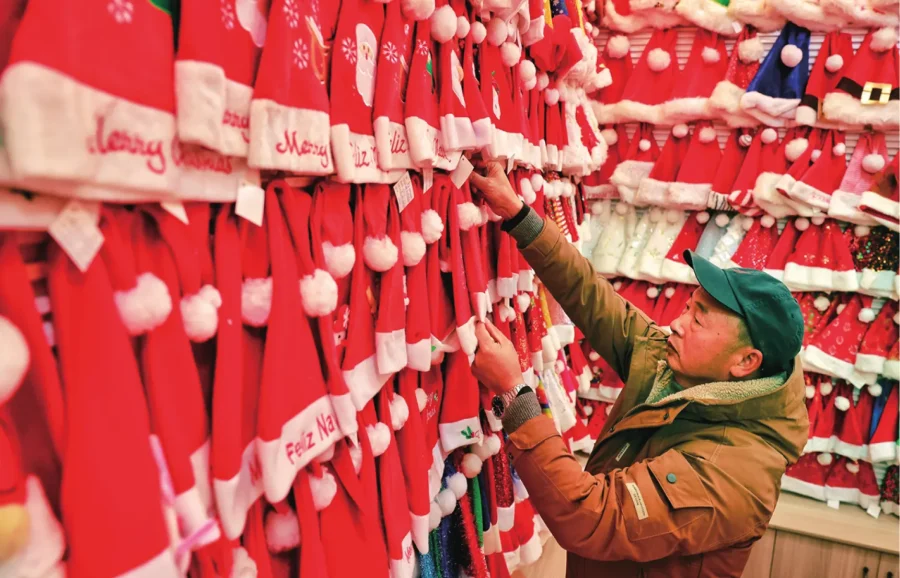Yiwu, a flourishing city in East China’s Zhejiang Province, is emerging as the trading hub for the Belt and Road Initiative (BRI). Global buyers throng to the city’s bustling small-commodity markets, while China-Europe freight trains are lining up to embark from the city, full with merchandise bound for destinations across the Eurasian continent.
Dubbed as the “world’s capital of small commodities” or the “world’s supermarket”, Yiwu is a treasure trove where global buyers could find the products they want, from Christmas presents and decorations, sports equipment, household appliances, textiles, shoes to bags and suitcases. The list goes on.
There are about 75,000 shops scattered in Yiwu International Trade Market, and if one spends three minutes in each shop, based on the eight-hour of shopping time per day, it would take over a year to visit all the shops and stalls, according to media reports.
Trade never rests Since the beginning of 2023, the Yiwu International Trade Market has been witnessing a daily influx of 200,000 visitors. With the weather turning colder now, there has been a peak in the sales of warm daily necessities recently, local media outlets reported.
“I am exploring the vast retail market for motorcycle helmets and gloves,” Mohamed Humsi, a trader from Jordan, told the Global Times on Tuesday while at the market.
“As a first-time visitor, I am amazed by the wide range of products available here. The local people are incredibly friendly and helpful,” Humsi said.
Humsi said that he has noticed a growing demand for Chinese-made products, especially customers from the Middle East. “The Yiwu market is so huge that it’s absolutely necessary to have a map to help me find my way around its countless sections.”
China and Jordan have signed a memorandum of understanding (MoU) on jointly promoting the construction of the BRI, Xinhua News Agency reported on November 30.
China has signed Belt and Road cooperation documents with all 22 Arab countries and the Arab League, Foreign Ministry Spokesperson Wang Wenbin told a press briefing on Wednesday.
Many vendors in Yiwu have developed specialized products to cater to the customers from BRI partner countries.
Wang Xiaoli, a Yiwu-based vendor specializing in Christmas decorations, said that her main customer base is from South American countries.
“Since the Christmas season draws near in the Western Hemisphere, we have developed Christmas tree decoration balls in light and cold colors to cater to this market’s needs,” Wang told the Global Times on Tuesday.
Another vendor, Sun Lijuan, a toy maker, receives over 50 percent of her orders from the Middle East. This year, her sales to Saudi Arabia have reached an all-time high.
“To cater to this market, we have developed dolls equipped with language models capable of interacting with our customers there and answering dozens of questions in Arabic,” Sun told the Global Times on Tuesday.
Growing connectivity For decades, Yiwu has been actively integrating into the country’s comprehensive strategy of opening-up, leveraging internationalization as its greatest strength and unique feature. Since the proposal of the BRI coming out 10 years ago, Yiwu has been dedicated to positioning itself as a globally renowned trade hub for the initiative.
On November 21, the “Yixin’ou” (Yiwu-Xinjiang-Europe) China-Europe express freight train, commemorating the tenth anniversary of the BRI, departed from Yiwu with 110 standard containers loaded with goods, including Christmas supplies, automotive parts and machinery.
The train set out on its journey to Madrid, Spain, marking the 1,496th departure of the freight train from Yiwu city in 2023. The cargo route linking Yiwu with Europe via Northwest China’s Xinjiang Uygur Autonomous Region is the world’s longest international freight train route and has become a key platform for the city to participate in the BRI construction.
For a decade, the “Yixin’ou” China-Europe express freight trains have traversed the Eurasian continent, connecting BRI partner countries and transporting over 2.1 million varieties of goods from Yiwu to various destinations. In return, they bring back 100,000 varieties of products from over 100 countries, converging at the Yiwu International Trade Market.
In 2022, Yiwu’s import and export with the BRI partner countries reached 190.2 billion yuan ($26.58 billion), a threefold increase compared to 2013. In the first three quarters of the year, the trade figure totaled 264.99 billion yuan, up 24.8 percent year-on-year, local customs data showed.
Along the construction of the BRI, Yiwu has played a crucial role in trade connectivity, and a fundamental factor contributing to this success is its unparalleled logistical connectivity, Song Wei, a professor at the School of International Relations and Diplomacy at Beijing Foreign Studies University, told the Global Times on Thursday.
The connectivity of this infrastructure holds significant importance for the global division of labor by value chains, and the high-quality development of the BRI. For many developing countries, insufficient transportation connectivity has proved to be a major bottleneck restricting their development, Song said.
In the future, China will continue to ramp up efforts to enhance road connectivity, particularly cross-border infrastructure construction, to facilitate cooperation between China and BRI partner countries, according to Song.
In addition to physical infrastructure, there is also a need to strengthen “soft connectivity” among China and all the BRI partner countries, by joining hands to promote the reduction of trade barriers among the participating economies and collectively resist rising protectionism and the anti-globalization tide fermented by certain Western countries, Song stressed.









